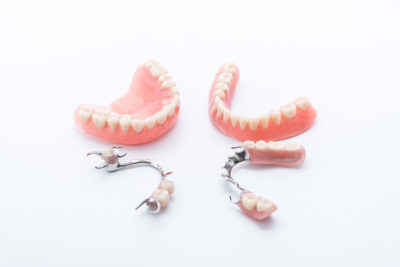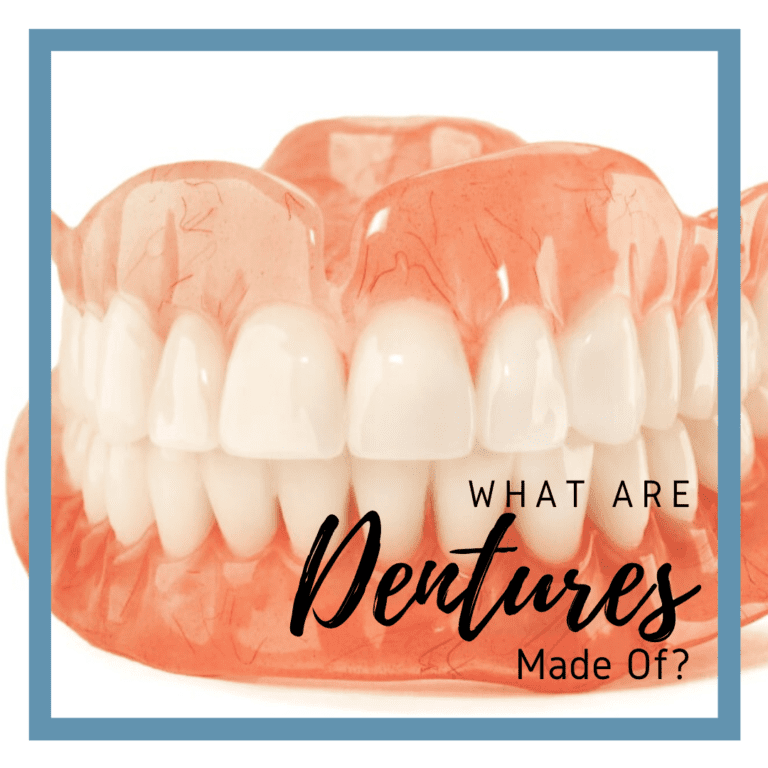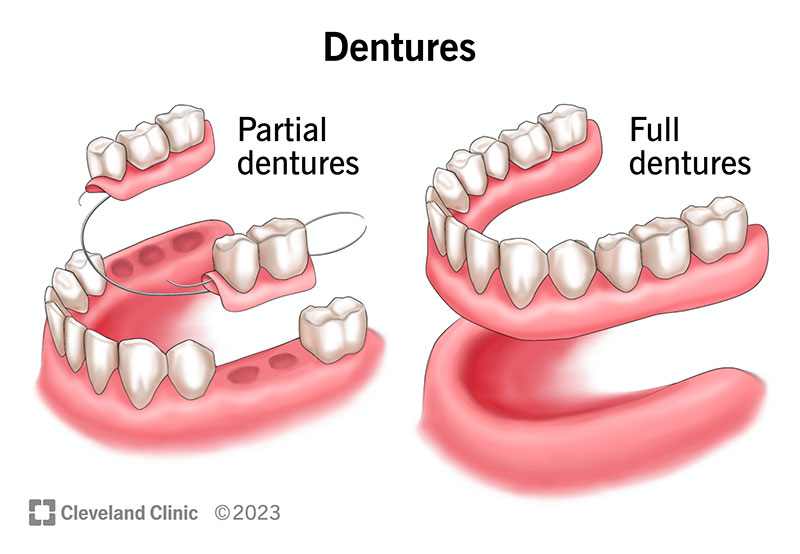what are dentures made of
Dentures are typically made from plastic, specifically acrylic resin. Some dentures may also be made from porcelain.
Dentures are removable dental appliances that replace missing teeth and their surrounding tissues. They are custom-made to fit the individual’s mouth and can be made from various materials. The most common materials used for dentures are acrylic resin, porcelain, and metal.
Acrylic resin is the most affordable option and is often used for full or partial dentures. Porcelain dentures are more durable and have better aesthetics, making them a popular choice. Metal dentures, usually made from cobalt-chromium, are strong and thin, making them suitable for partial dentures. Understanding the materials used to make dentures can help individuals make informed decisions about their dental care.

Credit: www.breezybaydental.com
Introduction To Denture Materials
Dentures are commonly made of acrylic resin, a durable material that securely adheres to the base. Porcelain dentures, while pricier, offer superior strength and aesthetic appeal, making them a popular choice for those seeking both durability and beauty in their dental prosthetics.
Historical Perspective
Dentures have been used for centuries to replace missing teeth. In the past, dentures were made from a variety of materials including animal teeth, ivory, and even human teeth. These materials were often uncomfortable and did not fit well.Current Trends In Denture Materials
Today, dentures are typically made from plastic, specifically acrylic resin. This material is lightweight, durable, and easy to adjust. Acrylic dentures are also less expensive than other materials, making them a popular choice for many people. In addition to acrylic, there are other materials that can be used for dentures. Porcelain dentures are another option, which are known for their durability and aesthetic appeal. However, they are more expensive and can be more fragile than acrylic dentures. Another material that is gaining popularity is flexible resin, which is a type of nylon. This material is more comfortable than other denture materials and can be a good option for people with sensitive gums. It is important to discuss the different materials with your dentist to determine which one is best for you. Dentures should fit well and be comfortable, so choosing the right material is crucial.Types Of Denture Base Materials
Dentures are dental prosthetics used to replace missing teeth and surrounding tissues. The base of dentures, which supports the artificial teeth, can be made from different materials based on patients’ needs and preferences.
Acrylic Resin Advantages
Acrylic resin is a common material used for denture bases due to its affordability and flexibility. It is lightweight and can be easily adjusted for a comfortable fit. Acrylic resin dentures are also durable and resistant to staining, making them a popular choice for many patients.
Metal-based Options
Metal-based dentures are known for their strength and longevity. Metal denture bases, often made of cobalt-chromium alloy, provide a stable foundation for the artificial teeth. These dentures are thinner and more lightweight compared to acrylic options, offering a comfortable and secure fit.
Nylon And Flexible Alternatives
Nylon and other flexible materials are gaining popularity for denture bases due to their comfort and durability. Nylon dentures are lightweight, resistant to breakage, and can adapt to the natural movements of the mouth. These flexible alternatives provide a snug fit and a natural-looking smile.
Porcelain Vs. Acrylic Teeth
Dentures fashioned using porcelain are sturdier since porcelain is a stronger material than acrylic. Besides being sturdy, porcelain dentures have excellent aesthetics making them the best material in beauty.
Durability And Longevity
Porcelain teeth are known for their durability and longevity compared to acrylic. They are more resistant to wear and tear, making them last longer.
Aesthetic Comparison
When it comes to aesthetic comparison, porcelain teeth are superior to acrylic in terms of natural appearance and translucency, closely resembling natural teeth.
Maintenance Considerations
Porcelain teeth require meticulous care to maintain their appearance, while acrylic teeth are easier to maintain and repair, making them more suitable for individuals with specific maintenance needs.

Credit: bethesdafamilydentistry.com
Cost Analysis Of Denture Materials
Dentures are commonly made from various materials such as acrylic, nylon, porcelain, resin, or metal. Each material has different cost implications, which can impact the overall expense of getting dentures.
Comparing Expense
When it comes to cost, acrylic resin dentures are generally more affordable compared to other materials. On the other hand, porcelain dentures, while pricier, are known for their durability and aesthetic appeal.
Long-term Cost-effectiveness
Although acrylic resin dentures may have a lower upfront cost, they tend to wear out faster and may require frequent adjustments, potentially increasing the long-term expenses. Conversely, porcelain dentures, while initially more expensive, are durable and may have a lower long-term cost due to their longevity and minimal need for replacements or repairs.
The Pink Part: Gum Mimicking
When it comes to dentures, the pink part plays a crucial role in mimicking the natural appearance of gums. This part not only enhances the aesthetic appeal of dentures but also ensures a comfortable fit for the wearer.
Materials For Realistic Gums
The pink part of dentures, which simulates the appearance of gums, is typically made from a specialized acrylic resin. This material is carefully tinted to match the natural color of the gums, creating a lifelike and realistic effect.
Integration With Denture Teeth
Integration of the pink gum-like material with the denture teeth is a meticulous process. The realistic gums are seamlessly blended with the artificial teeth to create a cohesive and natural-looking prosthesis, ensuring a harmonious overall appearance.
Strength And Comfort Factors
When it comes to dentures, the strength and comfort factors are crucial considerations for individuals seeking a reliable and comfortable dental solution. Understanding the materials used in denture fabrication and their impact on strength and comfort can help you make an informed decision when choosing the right dentures for your needs.
Material Impact On Strength
The choice of materials used in denture construction significantly affects their strength. Porcelain dentures, for example, are known for their sturdiness, as porcelain is a stronger material compared to acrylic. In addition to their strength, porcelain dentures also offer excellent aesthetics, making them an ideal choice for those prioritizing both durability and beauty.
Comfort And Fit
The comfort and fit of dentures are equally important considerations. Acrylic resin, a commonly used material for dentures, offers good comfort and fit due to its ability to adhere securely to the denture base. This secure adherence makes it easier to adjust the dentures to ensure a comfortable and personalized fit for the wearer.
Allergies And Biocompatibility
Dentures are commonly made of plastic, specifically acrylic resin, which provides durability and ease of adjustment. Some opt for porcelain dentures for their superior strength and aesthetic appeal. The choice of material depends on individual preferences and needs.
Hypoallergenic Options
Dentures are typically made from a variety of materials such as acrylic, nylon, porcelain, resin, or metal. For individuals with allergies or concerns about biocompatibility, there are hypoallergenic options available.
Ensuring Patient Safety
When it comes to dentures, ensuring patient safety is paramount. Dentists carefully consider each patient’s unique needs and potential allergies to select the most suitable materials for their dentures.
Innovations In Denture Fabrication
Dentures are typically made from plastic, specifically acrylic resin, which is durable and adheres securely to the denture base. Some people opt for porcelain dentures, known for their strength and aesthetic appeal. Additionally, denture frameworks may also incorporate materials such as nylon, resin, or metal, depending on the specific type of denture being fabricated.
Innovations in Denture Fabrication Dentures have come a long way since their inception in the early 18th century. With technological advancements, the materials used to fabricate dentures have also evolved. Today, dentures can be made from a variety of materials, including acrylic resin, porcelain, nylon, and metal.Technological Advancements
Technological advancements have revolutionized the way dentures are fabricated. Computer-aided design and computer-aided manufacturing (CAD/CAM) have made it easier and quicker to create dentures with precise measurements. With 3D printing, dentures can be produced in a matter of hours, reducing the time it takes to get new dentures.Future Materials On The Horizon
The future of denture fabrication is promising with the development of new materials such as zirconia and graphene. Zirconia is a type of ceramic that is more durable and longer-lasting than traditional materials. It is also biocompatible, meaning it is less likely to cause an allergic reaction. Graphene is a super-strong material that is lightweight and flexible, making it ideal for denture fabrication. These materials are still in the experimental stage, but they hold great promise for the future of denture fabrication. In conclusion, innovations in denture fabrication have led to the development of new materials and techniques that have improved the quality and durability of dentures. With the use of technology and the development of new materials, denture fabrication will continue to evolve and improve.
Credit: my.clevelandclinic.org
Frequently Asked Questions
What Is The Best Material To Use For Dentures?
Porcelain is the best material for dentures, as it is stronger and offers excellent aesthetics. It is sturdier and more visually appealing than acrylic.
What Are Most Dentures Made Of?
Dentures are typically made from plastic, specifically acrylic resin, which is strong and aesthetically pleasing.
What Are Cheap Dentures Made Of?
Cheap dentures are typically made of acrylic resin, a more affordable material compared to porcelain. Acrylic dentures may wear faster but are stronger and easier to adjust.
What Is The Pink Part Of Dentures Made Of?
The pink part of dentures is typically made of hard-based acrylic/polymer that is molded around and chemically joined to the teeth. It can also be combined with chrome cobalt for added strength in upper full dentures.
Conclusion
Dentures are commonly made from materials like acrylic, porcelain, resin, or metal. Each material offers different strengths and aesthetics. Porcelain dentures are sturdy and aesthetically pleasing, while acrylic dentures are more affordable and easier to adjust. Choose the material that best suits your needs.
